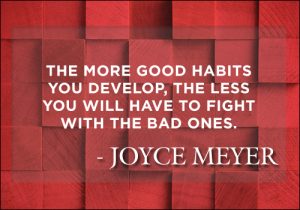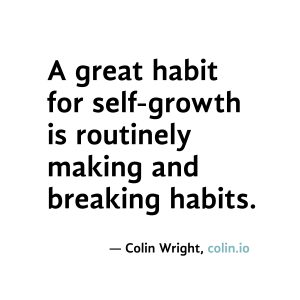According to brainpickings.org, it takes 21 days, at a minimum, to build a new habit. That’s 21 days of repeating the same action, at approximately the same time, and for something simple… like drinking a glass of water when you wake up each day. Another website suggests that it takes over two months – 66 days to be precise – before taking a certain action becomes “automatic”… in other words, a habit. Most other sites reporting on length of time for something to become a habit fall into that variation somewhere: between three weeks (at a BARE minimum for simple actions) to two months for more complex habits; or more difficult ones.
My interest in length of time to form a habit was driven by a curiosity about disciplining oneself to change eating and exercising habits. For most people, eating cleaner is a somewhat easy habit to build. It’s a matter of planning and shopping a menu; cutting out the junk that has been previously incorporated; denying yourself those crappy cravings for French fries when you’re driving past your favorite fast food spot. The fitness gurus all pretty much agree: food planning and preparation is by far the hardest part of increasing your health and fitness. Your body has to be fueled properly and putting junk into it absolutely harms more than helps. Putting high-octane clean fuel in can help you be healthier even if you don’t add an exercise program to go with the clean eating effort.
 But if it takes as much as two months to build a new (good) habit, how long does it take to break that same habit? Many people would believe that it’s easier to break a bad habit than to build a new good habit. They would be wrong. It seems that breaking bad habits takes longer even if it’s not an addiction or need based “bad” habit. Anyone who has ever quit (or tried to quit) smoking cigarettes will tell you: even after not having had a cigarette for three weeks… four weeks… four months… the craving is still there and sometimes quite strong. It takes a constant disciplined commitment to not repeating a bad behavior to keep that behavior from returning. So, while you may “kick the habit” of smoking within three weeks, that addicted drive behind what used to be habit is still there. The only reason you’re not still smoking is because of discipline and will. In other words, as much as we hate to think it, breaking a bad habit can be a big challenge for three to eight weeks and then a lessened effort… for the rest of our lives.
But if it takes as much as two months to build a new (good) habit, how long does it take to break that same habit? Many people would believe that it’s easier to break a bad habit than to build a new good habit. They would be wrong. It seems that breaking bad habits takes longer even if it’s not an addiction or need based “bad” habit. Anyone who has ever quit (or tried to quit) smoking cigarettes will tell you: even after not having had a cigarette for three weeks… four weeks… four months… the craving is still there and sometimes quite strong. It takes a constant disciplined commitment to not repeating a bad behavior to keep that behavior from returning. So, while you may “kick the habit” of smoking within three weeks, that addicted drive behind what used to be habit is still there. The only reason you’re not still smoking is because of discipline and will. In other words, as much as we hate to think it, breaking a bad habit can be a big challenge for three to eight weeks and then a lessened effort… for the rest of our lives.
The good news is that if you replace undesirable behaviors… “bad habits” with good behaviors… the new “good habits,” then avoiding the bad habits becomes easier. Part of the habitual behavior cycle is our drive or desire to do something at a given time. As the example, if you have that drive to pull out a cigarette to smoke, instead of pulling out a cigarette you pull out a healthy snack then you’re not just stopping one action; you’re not just creating a new action; you’re doing both at the same time.
 Again, my interest was in breaking the habits of eating junk food… and by that, I don’t just mean fast food but also the easier-to-prepare-low-in-nutritional-value foods that are common in too many kitchens. Grocery shopping with a focus on healthier foods proved relatively easy as habits go to break/build. Sure, there are still some easy-to-fix-not-so-nutritional foods in our pantry/refrigerator, but on balance our food stocks are much healthier for us to consume; much more supportive of a healthy lifestyle. That said, it did take several trips to the grocery store with a focus on healthy buying before we didn’t constantly feel that “grab what we want” feeling.
Again, my interest was in breaking the habits of eating junk food… and by that, I don’t just mean fast food but also the easier-to-prepare-low-in-nutritional-value foods that are common in too many kitchens. Grocery shopping with a focus on healthier foods proved relatively easy as habits go to break/build. Sure, there are still some easy-to-fix-not-so-nutritional foods in our pantry/refrigerator, but on balance our food stocks are much healthier for us to consume; much more supportive of a healthy lifestyle. That said, it did take several trips to the grocery store with a focus on healthy buying before we didn’t constantly feel that “grab what we want” feeling.
Once the junk food wasn’t as prevalent in our pantry or fridge, it was also easier to eat clean at home. But that was only half the battle. The other half was adding in a structured exercise regimen. As a military and law enforcement veteran I’m no stranger to physical training. I’ve studied it enough as well to be empower myself to quickly overcome most of the arguments brought up against exercise. “I don’t have enough time.” “Work gets in the way.” “I’m too tired.” “I don’t feel good.” Uh huh.
This is where discipline comes in to replace motivation. It’s when you force yourself to go do that cardio you aren’t feeling… to go to the gym and lift the weights you perceive as stronger than yourself (at the moment). It’s when you put on your workout clothes, tie your shoes and go “just do it.” It can be an absolutely miserable moment. On the other hand, the tenth time you do it… the twentieth… the thirtieth… it’s far easier. As the habit of exercising is built it feels less like punishment and more like a break from life.
I know one fitness coach who espouses meditation as a daily habit and another who suggests that meditation is what he does when he’s on his treadmill, zoned out, just running, in his stride, breathing deep and easy… and nothing particular on his mind. That was his form of meditation. It was his escape from “the world.” But he will freely admit that it took him almost a month, when he first started, to look forward to that time making himself sweat and building up that capacity to run for as long as he eventually did.
But I started out talking about building and breaking habits. The fitness related goal is to break the junk food no exercise bad habits and build the eating healthier and exercising habits. Doing so is a combination of breaking bad habits and building new good habits at the same time. It would be fantastic if this was accomplished in a mere three weeks, but the reality is that it may take a month or more. The questions you have to ask yourself as you look at that reality are:
Are you strong enough? It’s a month of “good behavior.”
Can you do that to break the bad habits and build the good new habits?
How bad do you want a healthier, longer life?


